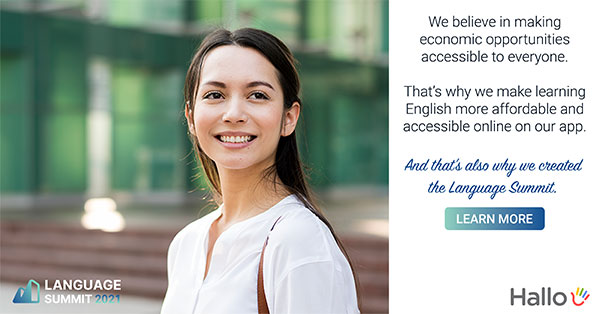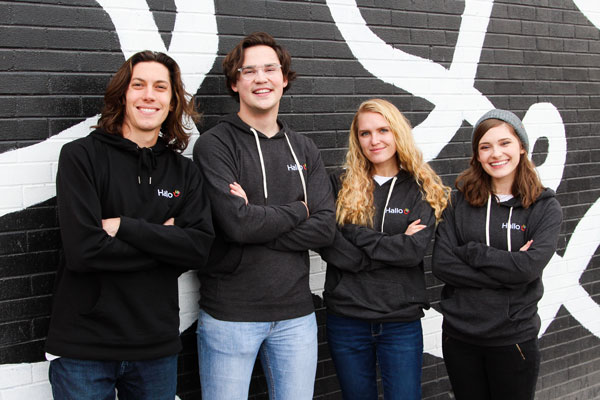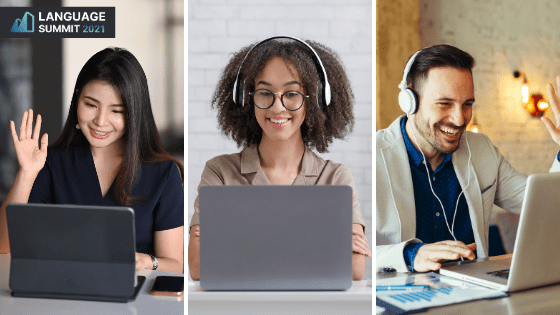This time last year, Ashley Whitesides was excitedly thinking about all the possible ways Language Summit was going to aid English-language learners and educators around the world. She and her team at Hallo had already established that their newly conceptualized Language Summit was not going to be like any other conference currently on the market.
“I couldn’t stop thinking about how this conference could help inspire people, help motivate them, and help them find solutions to their problems in their time of need,” said Whitesides.
When the Hallo team unanimously agreed the summit would move forward, Whitesides became co-founder and director of the Language Summit, touching every aspect of this new project to ensure it would leave a lasting first impression on the attendees.
Hallo is a low-cost on-demand learning app that allows students to join live English classes and practice speaking with certified English teachers and other students anywhere, anytime. Their mission is to “democratize language learning” by making English learning accessible and affordable for all students, even those in remote and rural locations, where teachers are scarce and classes are expensive. Hallo’s overarching vision is that accessible and budget-friendly English-learning can be achieved through online methods. This vision helps set the stage for the Language Summit that is approaching in March 2021.

The Language Summit, scheduled for March 3-5, 2021, will be the first online conference, and perhaps the first conference ever, dedicated to bridging language education and the advancement of different technologies in which English can be learned and taught effectively by real teachers. It will challenge “ outdated frameworks, technologies, and pedagogies ” to create space and give notoriety to less-recognized innovative solutions. With this foundation in mind, the creators of the summit have larger goals, one of them being to unite and empower the segmented industries of edtech and language learning.
Whitesides said proudly, “We’re the first language learning and edtech conference.”
Origins of the Language Summit
Language Summit was birthed out of desperation and frustration.
In early spring 2020, just before the coronavirus pandemic was conceived as a global health crisis, the Hallo executive team was on a quest to attend an ELT (English Language Teaching) conference for the first time since the platform’s launch in April of 2019. With over one million learners acquired in just under eighteen months, this was Hallo’s first major attempt to connect with like-minded creators and experts in the edtech-language-learning industry. But they found the landscape desolate.
There were well-established conferences like the IATEFL International Annual Conference and TESOL International Convention, but their emphases skewed towards research and curriculum. Were there really no other companies that wanted to discuss language learning through the lens of innovative methods and technology? Would the ELT and edtech industries continue to exist in silos?
“What we noticed is that there are a very limited number of conferences, edtech companies, and schools that are actively trying to unite the industry to create the future of language learning,” Whitesides said, recalling that co-founder, Benjamin Dent, would not accept the status quo. “Whether it was a moment of genius or lapse of judgment, we decided to host our own virtual conference.”
When Whitesides and her team began pitching the Language Summit to ELT and edtech specialists and companies, the feedback began pouring in and the themes, topics, and speakers began molding into a fully developed conference.

A few members of the Hallo team, including Language Summit co-founders Benjamin Dent (pictured far left) and Ashley Whitesides (far right).
Based on this feedback, a conference program was designed, giving teachers the opportunity to learn about innovative technology and teaching methods and network with peers from around the world.
At the first annual summit, attendees will get to hear from presenters from an array of backgrounds and countries, such as Manuel Mata, the National Coordinator of the Alliance for Bilingualism in Costa Rica, and Venice Irving, CEO of the Jamaican-based online tutoring app, Happy Teachers, to name a few.
New and innovative companies in the edtech and language-learning space will be introduced, like Lo-Fi Language Learning, whose new Arts ‘n EFL training program prepares English teachers to use hip-hop and rap in the classroom.
The presentation schedule also has a range that’s not typical of a traditional conference. Dr. Tonya Tripp from Alegra Learning will be discussing “teaching empathy through technology” and Vidia Hawaria, a student subscriber of Hallo from Indonesia, will discuss how traditional English classes failed her immensely.
At the first-ever Language Summit, the creators want all attendees to walk away with a new, revolutionized view of their industry where 1) edtech and language learning unite to become a single entity, 2) educators from every corner of the earth connect to empower a global community, and 3) new technologies for creating successful results are introduced and implemented.
Why Now?
“We totally believe that people can connect and find and create meaningful connections through technology, through video conferencing… and I think a lot of traditional conferences don’t believe that,” said Whitesides on the decision to host the Language Summit entirely online.
The Language Summit creators’ mission to promote the efficacy of digital technology in the language space is largely why the conference will be held completely online, although that is not the only reason. Since Hallo as well as many of the speakers, represent or use edtech companies, the creators felt it was only right to host this event online. The ongoing pandemic helped accelerate their vision to execute this conference since social distancing is still vastly enforced in most parts of the U.S. and the world.
“We chose a specific platform that is state of the art, but not overly extravagant,” Whitesides said. “But it’s much better than Zoom.”
Even though global mandates will enforce virtual modalities for the foreseeable future, Hallo will continue to choose the online modality for summits to come, even when in-person gatherings are safe. Not only is the online modality core to Hallo’s brand and reputation, but it’s also simply more affordable and accessible for teachers, and that is the true motivator to continue the online approach.

However, it is not lost on Whitesides and her team that “Zoom fatigue” is real, and certainly is a challenge worth addressing and perfecting during the first run-through.
Language Summit is hoping attendees will not be discouraged by yet another virtual conference after a whole year has passed in which social events and professional gatherings have been held via video conference. In an effort to make the event more interactive, InEvent, the platform Language Summit will be using for the entire event, will allow for more engagement with the summit’s sponsors, specifically for showcasing their products and services.
Language Summit also recognizes that throughout the pandemic, professional development budgets at schools have been the first to be slashed and teachers are often left to support their own professional growth and enrichment.
“Teachers and professors are looking for opportunities to continue to learn, especially online teaching and technology, but they don’t have the budget to pay for an education conference, which is typically hundreds if not thousands of dollars,” said Whitesides.
Engagement will be especially important during the conference’s breakout sessions, where ELT teachers will have the opportunity to participate in “hands-on” professional development tracks that will focus on continued education and career opportunities. Language Summit is looking to provide this timely solution to teachers that have lacked support from their employers and who need other resources that are affordable.
A Global Speaker Lineup
Hallo, like Bridge, believes in empowering a global community of English teachers, and that was a huge motivator for Bridge to be one of Language Summit’s Platinum Sponsors. As a result, Bridge will be sponsoring ten speakers for the event.
“Bridge is proud to be a Platinum Sponsor of the first-ever Language Summit. We strongly believe in the event’s mission to empower people and organizations in our industry with the technology, resources, and knowledge they need to co-create the future of language learning,” said Karyssa Cox, Bridge’s Director of Marketing Operations.
As general session panelists at the Summit, Manuel Mata and Vidia Hawaria, based outside the U.S., each bring a unique perspective on technology and language learning.
While browsing through the Language Summit’s background, Mata is mentioned because his success with integrating English into all Costa Rican grade school curricula was only achieved through education technology, which is exactly what Language Summit is all about.
“Our goal is to have English in all schools,” Mata said. “It is very difficult [in Costa Rica] to hire an English teacher at remote schools that only have a few students. That said, it is important to take advantage of technology in order to benefit our students.”
As the National Coordinator for the Alliance of Bilingualism, reporting directly to the Minister of Education in Costa Rica, Mata’s vision is to create an English-learning system that starts in primary school, and upon entering high school, Costa Rican students will be English proficient. A partnership with Alegra Learning immensely helped forge this vision to execution, along with grass-roots efforts from private and public school teachers, particularly when the coronavirus pandemic impacted in-person learning in Costa Rica.
The collaboration between Costa Rica’s Ministry of Education and Alegra Learning is a great case study for other developing nations who seek a similar language model. It’s a unique public/private partnership in education that’s directly impacted 58,000 Costa Rican primary school students and growing every day.

Additionally, Mata is cognizant of neighboring countries in Latin America that have identical goals to implement dual-language programs within their education systems. Studies show that proficiency in English significantly improves a non-native speaker’s career opportunities and income level. Research also shows a direct correlation between advanced English skills and better national economies, which is critical to the survival of developing nations.
“I think it’s important that people from other countries know what we’re doing in Costa Rica,” said Mata. “And perhaps we can create new channels of communication and form alliances to help us improve our goals. We want to show that if you have the right connections and the right vision, we can make lives better for our students.”
Vidia Hawaria is one of the only speakers at this summit who is not a platform creator, expert, policymaker, or teacher in the ELT industry. She is a regulatory affairs coordinator for a pharmaceutical company in Indonesia, and continuing student of the English language.
Her journey as a non-native English-speaker is unique and worthwhile to any teachers at the Summit struggling to make headway with their students: she is a self-taught English-speaker who gained proficiency outside of the classroom.
How did she do this? By seeking learning opportunities beyond the textbook. Why did she do this? Because unfortunately, many of her teachers solely relied on textbooks, and this stunted her progress as a student.
“Unfortunately, from my time in elementary school, high school, to university, the teachers just went by textbook,” said Hawaria. “They would say ‘this is the formula, this is how you structure sentences…’ but they didn’t really make sense of how, when, and why we use these formulas.”
Hawaria was tapped to participate in one general session, “How To Choose the Best Products for the Greatest Student Learning Outcomes,” and another breakout session, “My Journey of Learning English Outside of School,” from the perspective of a student who has been learning and perfecting English since she was a child.
Hawaria is a strong advocate for various applications of “comprehensible input,” or full-immersive learning, because it favors the student learning a language through non-academic materials like music, magazines, and other media over dry, step-by-step drills.
Giving Teachers a Platform – And Hope
Whitesides oversees every aspect of the Language Summit, but there’s one thing she cannot overlook: allowing every stakeholder in the education system to be represented, specifically the teachers.
Education during the pandemic has been hard for teachers, no matter where or how they have had to teach. Whitesides, a former teacher herself, knows the exhaustion that comes with the job and how it is exasperating when teachers are not able to voice their concerns or their innovative ideas publicly.
“This year has been a crisis for everyone, some more than others, but especially for teachers,” Whitesides says. “We want people to come [to the Summit] and feel safe, feel heard, and feel validated… feel like they have somewhere to go and that there is hope.”








